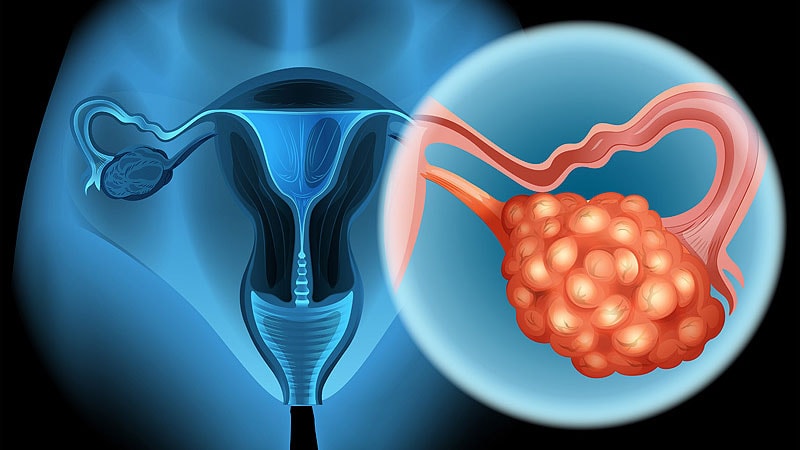EMA Begins Review of Rucaparib After Finding of Shorter Survival
The European Medicines Agency (EMA) has begun a review of rucaparib (Rubraca), a drug used in the treatment of patients with relapsed ovarian and related cancers that have a BRCA mutation.
The review was triggered by the finding of shorter overall survival (OS) with rucaparib when compared to chemotherapy at an interim analysis of the ongoing ARIEL4 trial.
The EMA has recommended that, while the review is taking place, clinicians not initiate treatment with rucaparib in new patients with cancer of the ovary, fallopian tubes, or peritoneum that have a BRCA mutation and whose cancer has recurred following at least two platinum-based chemotherapies and who cannot receive further platinum-based therapy (third-line treatment).
This recommendation, however, does not affect the use of rucaparib as maintenance treatment following chemotherapy, the agency noted.
Clovis Oncology, the manufactuer, told Medscape Medical News that “almost all rucaparib use is in the maintenance treatment setting,” which is not the subject of this review.
The manufacturer has agreed to issue a “Dear Doctor” communication in Europe to inform prescribers about the interim OS results of ARIEL4.
Clovis also said that it is actively working to respond to the questions raised by EMA regarding an agreed-upon timetable, which includes the agency providing an opinion or a list of outstanding problems by June 2022.
PARP Inhibitor Drug
Rucaparib is a PARP (poly [adenosine diphosphate-ribose] polymerase) inhibitor. It was approved in Europe in 2018. In the EU and the UK, the indication is monotherapy treatment for adult patients with platinum sensitive (relapsed or progressive), BRCA mutated (germline and/or somatic), high-grade epithelial ovarian, fallopian tube, or primary peritoneal cancer who have been treated with two or more prior lines of platinum-based chemotherapy and who are unable to tolerate further platinum-based chemotherapy. It is not approved for the treatment of patients with platinum-resistant tumors.
The product has similar indications in the United States but is also approved there for use in men with metastatic castration-resistant prostate cancer (mCRPC) that harbors deleterious BRCA mutations (germline and/or somatic).
Finding of Shorter OS
The ARIEL4 study is comparing rucaparib with chemotherapy in patients with high-grade cancer of the ovary, fallopian tubes, or peritoneum with a BRCA mutation whose cancer has come back after chemotherapy.
Results from this phase 3 study were recently published online in The Lancet Oncology. They showed a significant benefit from rucaparib for progression-free survival (PFS), the primary endpoint of this trial. In the intention-to-treat population (233 in the rucaparib group; 116 in the chemotherapy group), median PFS was 7.4 months in the rucaparib group, vs 5.7 months (5.5–6.7) in the chemotherapy group (hazard ratio, 0.67; P = .0017).
These results show that rucaparib is an “active and a reasonable alternative to chemotherapy for women with advanced, pretreated, BRCA1/2-mutated ovarian cancer,” wrote the author of an accompanying editorial, Dearbhaile O’Donnell, MD, from St. James’s Hospital, Dublin, Ireland.
The trial authors noted that the results for OS were immature (178 events reported; 51% mature).
In the article, they also noted that three deaths occurred that were considered to be potentially related to rucaparib (one due to cardiac disorder, one due to myelodysplastic syndrome, and one with an unconfirmed cause).
Clovis emphasized that there is no new safety issue and noted that the EMA announcement of this review also said that “there are no new safety concerns with the medicine.”
The company also said that the “dataset from this trial is complex to interpret.”
OS is a secondary endpoint in the study. An interim analysis favored the chemotherapy treatment arm vs the rucaparib arm, the company said. This information was submitted to EMA in August 2021 and also to the US Food and Drug Administration in September 2021.
However, patients who were randomly assigned to receive chemotherapy were permitted to cross over if disease progression occurred and receive rucaparib, the company pointed out. Overall, at the interim analysis, 88% of all ARIEL4 participants had received rucaparib either as the treatment they were assigned to or as crossover treatment.
The EMA said in its announcement that it will assess all available information on the use of rucaparib as third-line treatment and recommend whether the product’s marketing authorization in the EU should be maintained or changed.
For more from Medscape Oncology, join us on Twitter and Facebook.
Source: Read Full Article
